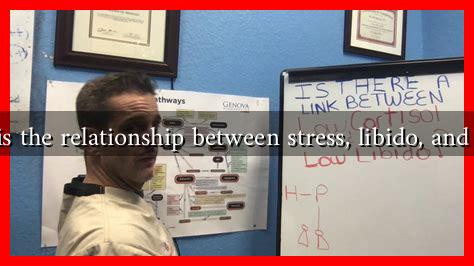-
Table of Contents
What is the Relationship Between Stress, Libido, and Aging?
As we navigate through life, the interplay between stress, libido, and aging becomes increasingly significant. Understanding how these factors influence one another can provide valuable insights into maintaining a healthy lifestyle and emotional well-being. This article delves into the intricate relationship between stress, libido, and the aging process, supported by research and real-world examples.
The Impact of Stress on Libido
Stress is a common experience in modern life, affecting individuals of all ages. However, its impact on libido—our sexual desire—can be profound. When the body experiences stress, it triggers a cascade of physiological responses, including the release of stress hormones like cortisol and adrenaline. These hormones can significantly affect sexual desire and performance.
- Hormonal Imbalance: Chronic stress can lead to hormonal imbalances that diminish libido. For instance, elevated cortisol levels can suppress testosterone production, a key hormone in sexual desire for both men and women.
- Psychological Factors: Stress often leads to anxiety and depression, which can further reduce sexual interest. A study published in the Journal of Sexual Medicine found that individuals with high levels of stress reported lower sexual satisfaction.
- Relationship Strain: Stress can also create tension in relationships, leading to decreased intimacy and connection, which are vital for a healthy libido.
Aging and Its Effects on Libido
Aging is a natural process that brings about various physical and psychological changes. One of the most notable changes is the decline in libido, which can be attributed to several factors:
- Hormonal Changes: As individuals age, particularly women during menopause and men as they enter andropause, there is a natural decline in sex hormones. This decline can lead to reduced sexual desire and performance.
- Health Issues: Older adults often face chronic health conditions such as diabetes, heart disease, and arthritis, which can affect libido. Medications for these conditions may also have side effects that impact sexual desire.
- Psychological Factors: Aging can bring about feelings of insecurity, body image issues, and depression, all of which can contribute to a decrease in libido.
The Interplay Between Stress, Libido, and Aging
The relationship between stress, libido, and aging is complex and multifaceted. As individuals age, they may experience increased stress due to various life changes, such as retirement, loss of loved ones, or health concerns. This stress can exacerbate the natural decline in libido associated with aging.
For example, a study conducted by the American Psychological Association found that older adults who reported higher levels of stress also experienced a more significant decline in sexual desire compared to their less-stressed counterparts. This highlights the importance of managing stress to maintain a healthy libido as one ages.
Strategies for Managing Stress and Enhancing Libido
Fortunately, there are several strategies that individuals can adopt to manage stress and enhance libido, particularly as they age:
- Regular Exercise: Physical activity is a powerful stress reliever and can boost libido by increasing blood flow and improving body image.
- Meditation and Mindfulness: Practices such as yoga and meditation can help reduce stress levels and improve mental clarity, positively impacting sexual desire.
- Open Communication: Discussing feelings and concerns with partners can strengthen relationships and enhance intimacy, which is crucial for maintaining libido.
- Healthy Diet: A balanced diet rich in fruits, vegetables, and whole grains can improve overall health and hormonal balance, positively influencing libido.
Conclusion
The relationship between stress, libido, and aging is intricate and deeply interconnected. As individuals age, managing stress becomes increasingly important to maintain a healthy libido. By understanding the effects of stress on sexual desire and recognizing the natural changes that come with aging, individuals can take proactive steps to enhance their quality of life. Implementing strategies such as regular exercise, mindfulness practices, and open communication can significantly improve both mental well-being and sexual health. Ultimately, fostering a holistic approach to health can lead to a more fulfilling and vibrant life, regardless of age.

